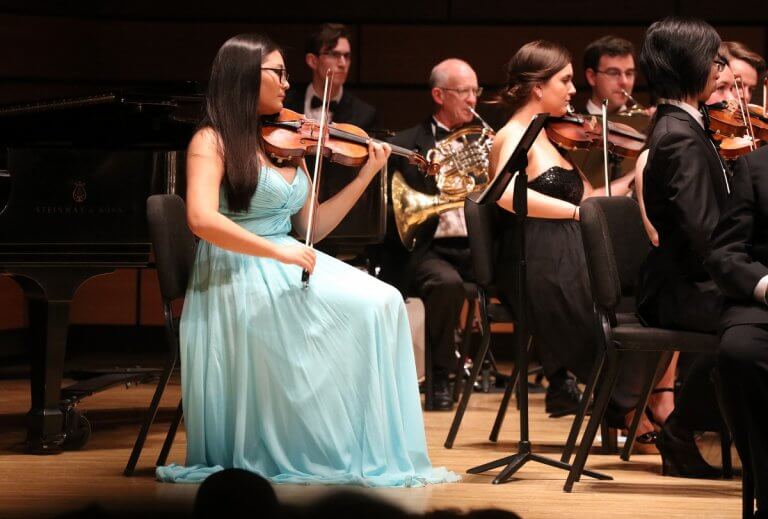
“Without music, life is a journey through a desert.”- Pat Conroy
Employers are increasingly turning away from STEM graduates towards more flexible creatives.
In 2011, a report made by the Confederate of British Industry laid out the key skills that define employability. Equipped with the seven elements of self-management, teamwork, business and customer awareness, problem solving, communication, numeracy and IT skills, students are said to be more effective in the working world.
All of these skills can be gained through the study of music, meaning that learners who choose to specialise in this area are primed to excel in today’s complex world.
If you delve deeper into the background of music studies, you’ll soon discover a path enriched with passion and dynamic career opportunities. As the art of learning an instrument requires both technical and creative abilities, it demonstrates to future employers your patience and flexibility.

Source: UConn, Department of Music
As an aspiring undergraduate, you’ll want your degree to suit the preferences of emerging industries and international employers. But it’s also important to follow your academic desires or regret not doing so.
Despite artistic fields such as music, drama and dance being overlooked by learners who are worried about what the global employment scene requires, many overlook the advantages of possessing a degree that’s different. By mastering a musical discipline, you’ll stand out in a crowd of career-ready graduates and refine an inventive flair that many companies crave.
Music itself is an influential energy; it has the power to persuade, motivate and eradicate negative feelings. Consider the recent World Cup fever, from which psychologists uncovered that music helps footballers prepare for the pitch and allows them to get their head in the game.
Study International also unraveled the link between effective studying and music listening. By outlining the best genres to tune into during library breaks or solo-prep sessions, it’s clear that music has a strong influence on many students.
Overall, the subject has a fundamental role to play in the modern world. Although there are concerns that the field is being overshadowed by tech and science degrees, music takes learners to another level of creative and critical thinking that other graduates cannot obtain.
That’s why the topic is, and will always be, desirable and in high-demand.
Here are 5 Departments of Music that offer graduates a valuable learning experience…
DAN SCHOOL OF DRAMA & MUSIC, QUEEN’S UNIVERSITY – CANADA
With the flexibility to specialise in theory and composition, musicology, music education or applied study (performance), students have a world of options to explore in the Bachelor of Music program at the Dan School of Drama & Music, Queen’s University.
Learners with a passion for musical performance and digital music technology also have the option of a five-year program leading to both a BMus degree plus a diploma in Music and Digital Media, while courses in entrepreneurship and a graduate degree program in Arts Leadership prepare students to connect with the world beyond the Dan School and the Queen’s Community.

Source: Dan School of Drama and Music
Outside of the classroom, the Dan School offers a multitude of intensive programs and ensembles to a vibrant, inclusive community of aspiring creatives, captivating students with state-of-the-art studios, engaging seminars, workshops, music theatre experiences, and multi-media spaces.
Uniquely positioned at the intersection of academics, performance, research and innovation, the Dan School strives to make an impact on both its students and the global arts network. Faculty members have won prestigious awards such as the Mayor’s Art Award, JUNO awards, and fellowship status for the Royal Society of Canada.
Queen’s University is located in beautiful Kingston, Ontario, ideally situated between Toronto, Montreal and Ottawa, surrounded by Lake Ontario and the St. Lawrence River. No matter where students come from, Queen’s offers the perfect combination of a world-class international education in a small town Canadian home away from home.
DEPARTMENT OF MUSIC, UNIVERSITY OF CONNECTICUT (UCONN) – US
As the most comprehensive public university music program in New England (offering BA, BM, MA, MM, DMA & PhD), UConn’s Department of Music grants a solid foundation in musicianship to meet the demands of 21st-century musical endeavor.
The UConn Department of Music cultivates every learner’s creative skills and artistic sensibilities. They grant UG students the freedom to take part in ensembles and, powered by the school’s professional facilities and ever-growing reputation, UConn caters to opera, jazz, music historians and beyond.
Supplying students with skills that transcend the boundaries of music, graduates of this school soon develop into real-world performers, scholars and teachers. With 45 faculty members (formed of top performing artists, teachers and scholars) plus 150 undergraduate students currently working towards a bachelor’s in music, it’s a sought-after academic institution.
The school itself is close to Hartford, Boston & NYC so there are plenty of opportunities to get involved with the world-class music scenes at the UConn campus and these nearby cities!

Source: UConn, Department of Music
SCHOOL OF MUSIC, UNIVERSITY OF ALABAMA – US
The Alabama School of Music has more than 350 music majors and 35-full time faculty members, making it a harmonious hub of expertise and specialist knowledge.
To enhance student’s practice, the school hosts several jazz and opera rooms, large teaching studios, research labs for music education and therapy and specialized areas for electronic and computer music.
For prospective students, there’s an array of programs to tweak your flute, guitar, organ, bassoon, percussion or cello skills. Graduate students can kickstart their musical career with either a Master of Music (MM) or a Doctor of Musical Arts (DMA).
Alabama School of Music believes music is for everyone and every learner should have a fair chance at pursuing their passion. To encourage this, the Community Music School (CMS) serves students of all abilities and promotes private strings and bass instruction; as well as a free music fundamentals course for first-timers.
SCHOOL OF MUSIC, UNIVERSITY OF ILLINOIS AT URBANA-CHAMPAIGN – US
Ever dreamed of studying at a center for creativity and collaboration? At the University of Illinois School of Music, you’ll be exposed to an environment of musical performance, research and education.
By embracing cutting-edge innovation and an array of artistic abilities, the school creates opportunities for learners in the modern music world. With various undergraduate courses in musicology, instrumental performance, vocal performance and jazz performance, choice at Illinois is unlimited.
To further their foundation of knowledge, learners often opt for graduate degrees such as the Master of Music (MM) and the Master of Music Education (MME). Outside of studies, they’ll also gain exclusive access to ensemble participation.
What makes this School of Music stand out is its Youth & Adult programs. Focused on providing outstanding music experiences for people on and off campus, like these regular Youth Concerts, it’s a well-rounded and accomplished institution to join.

Source: University of Illinois at Urbana-Champaign, School of Music
BOYER COLLEGE OF MUSIC AND DANCE, TEMPLE UNIVERSITY – US
Accredited by the National Association of Schools of Music (NASM), the Boyer College of Music and Dance at Temple University is committed to nurturing learners through quality programs and expressive art events.
Through a vast selection of academic programs, Boyer brings learners leaps and bounds closer to their preferred degree subject. Their Temple Music Prep organisation also offers individual lessons and group enrichment sessions specifically-designed for the training of young instrumentalists.
Since the college’s mission is to pair students’ musical aspirations with an appreciation of lifelong learning, there’s a broad spectrum of extra-curricular projects to enjoy, including spectacular dance performances, masterclasses and lectures.
Temple University’s College of Music and Dance also invites learners to summer workshops and professional development seminars. They treat personal progression as a priority, so here, music students will always feel at home and their symphonic skills will flourish.
*Some of the institutions featured in this article are commercial partners of Study International







